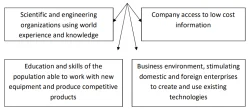Actual problems in modern pedogogy and pshychology / 2019 / July
Khujaniyazova Guzal Yuldashevna
3 July 2019, 15:22
Actual problems in modern pedogogy and pshychology / 2019 / July
Khujaniyazova Guzal Yuldashevna, Sultonova Umida, Bozorova Ozoda Xusainovna
3 July 2019, 15:21
Actual problems in modern pedogogy and pshychology / 2019 / July
Quchqorova Nargiza Mаmajonovna
3 July 2019, 15:19
Actual problems in modern pedogogy and pshychology / 2019 / July
3 July 2019, 15:18
Actual problems in modern pedogogy and pshychology / 2019 / July
Mirsagatova Nargiza Sayfullayevna
3 July 2019, 15:17
Actual problems in modern pedogogy and pshychology / 2019 / July
Isroilova Mahsuda Nig’matullayevna
3 July 2019, 15:16
Actual problems in modern pedogogy and pshychology / 2019 / July
Shodiyev Ilyosjon Narziqul o’g’li
3 July 2019, 15:15
Actual problems in modern pedogogy and pshychology / 2019 / July
3 July 2019, 15:14
Modern problems of Philology and Linguistics / 2019 / July
Kuvandik Olloyorov Madiyorovich, Dildora Khudayberganova
3 July 2019, 15:12
Modern problems of Philology and Linguistics / 2019 / July
Muksimova Nazokat Abdulloyevna, Yusupova Aziza Abdudjamilovna
3 July 2019, 15:11
